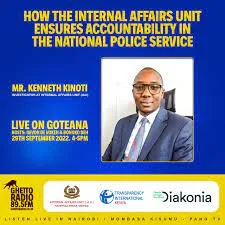73 on Responsibilities of leadership (1) Authority assigned to a State officer:- (a) is a public trust to be exercised in a manner that:- (i) is consistent with the purposes and objects of this Constitution; (ii) demonstrates respect for the people; (iii) brings honour to the nation and dignity to the office; and (iv) promotes public confidence in the integrity of the office; and (b) vests in the State officer the responsibility to serve the people, rather than the power to rule them.
(2) The guiding principles of leadership and integrity include:- (a) selection on the basis of personal integrity, competence and suitability, or election in free and fair elections; (b) objectivity and impartiality in decision making, and in ensuring that decisions are not influenced by nepotism, favouritism, other improper motives or corrupt practices; (c) selfless service based solely on the public interest, demonstrated by:- (i) honesty in the execution of public duties; and (ii) the declaration of any personal interest that may conflict with public duties;
(d) accountability to the public for decisions and actions; and (e) discipline and commitment in service to the people.
74. Oath of office of State officers:- Before assuming a State office, acting in a State office, or performing any functions of a State office, a person shall take and subscribe the oath or affirmation of office, in the manner and form prescribed by the Third Schedule or under an Act of Parliament.
75. Conduct of State officers:-(1) A State officer shall behave, whether in public and official life, in private life, or in association with other persons, in a manner that avoids:- (a) any conflict between personal interests and public or official duties; (b) compromising any public or official interest in favour of a personal interest; or (c) demeaning the office the officer holds.
(2) A person who contravenes clause (1), or Article 76, 77 or 78(2):-(a) shall be subject to the applicable disciplinary procedure for the relevant office; and (b) may, in accordance with the disciplinary procedure referred to in paragraph (a), be dismissed or otherwise removed from office; (3) A person who has been dismissed or otherwise removed from office for a contravention of the provisions mentioned in clause (2) is disqualified from holding any other State office... As read together with
-Article 10 of the Kenyan Constitution on 'National Values and Principles of Governance' binds all state organs, state officers, public officers and all persons whenever any of them: (a) applies or interprets the Constitution; (b) enacts, applies or interprets any law; or (c) makes or implements public policy decisions ; and -Article 75(1) of Kenyan Constitution requires a state officer to avoid any conflict of interest in public or official duties, as well as compromising public or official duties while favoring personal interests or demeaning the office held; and -Article 21 of the Kenyan Constitution says on 'Implementation of rights and fundamental freedoms that':- (1) It is a fundamental duty of the State and every State organ to observe, respect, protect, promote and fulfil the rights and fundamental freedoms in the Bill of Rights; and -Article 20 of the Constitution of Kenya says:- (1) The Bill of Rights applies to all law and binds all State organs and all persons. (2) Every person shall enjoy the rights and fundamental freedoms in the Bill of Rights to the greatest extent consistent with the nature of the right or fundamental freedom; and -Article 31C Constitution of Kenya says:- Every person has the right to privacy, which includes the right not to have— (a) their person, home or property searched; (b) their possessions seized; (c) information relating to their family or private affairs unnecessarily required or revealed; or (d) the privacy of their communications infringed; and -Article 4a of the Kenya Constitution? (4) The State shall not discriminate directly or indirectly against any person on any ground, including race, sex, pregnancy, marital status, health status, ethnic or social origin, colour, age, disability, religion, conscience, belief, culture, dress, language or birth; and -Article 32 of the Kenyan Constitution says:- (1) Every person has the right to freedom of conscience, religion, thought, belief and opinion; and -Article 50 Constitution of Kenya says :- (1) Every person has the right to have any dispute that can be resolved by the application of law decided in a fair and public hearing before a court or, if appropriate, another independent and impartial tribunal or body; and -Article 29F of the Constitution of Kenya on Freedom and security of the person says nobody shall be (f) be treated or punished in a cruel, inhuman or degrading manner; and -Article 28 of the Constitution of Kenya on 'Human dignity' says:- Every person has inherent dignity and the right to have that dignity respected and protected; and-Article 22 of the Constitution of Kenya says:- (1) Every person has the right to institute court proceedings claiming that a right or fundamental freedom in the Bill of Rights has been denied, violated or infringed, or is threatened; and -Articles 238 of the Constitution of Kenya on 'Principles of national security' Section (1) defines national security as the protection against internal and external threats to Kenya's territorial integrity and sovereignty, its people, their rights, freedoms, property, peace, stability and prosperity and other national interests ; while Section (2) states that 'The national security of Kenya shall be promoted and guaranteed in accordance with the following principles':- (a) national security is subject to the authority of this Constitution and Parliament; (b) national security shall be pursued in compliance with the law and with the utmost respect for the rule of law, democracy, human rights and fundamental freedoms; Also as read together with -Articles 239 of the Constitution of Kenya on 'National security organs' Section(3) categorically states that 'In performing their functions and exercising their powers, the national security organs and every member of the national security organs shall not':-(a) act in a partisan manner; (b) further any interest of a political party or cause; or (c) prejudice a political interest or political cause that is legitimate under this Constitution; and -Articles 243 of the Constitution of Kenya establishes the National Police Service (2) consisting of- (a) the Kenya Police Service; and (b) the Administration Police Service; for which (3) The National Police Service is a national service and shall function throughout Kenya; while (4) Parliament shall enact legislation to give full effect to this Article; and -Articles 244 of the Constitution of Kenya implicitly-and-explicitly defines-and-describes the 'Objects and functions of the National Police Service' categorically stating that the National Police Service shall:-(a) strive for the highest standards of professionalism and discipline among its members; (b) prevent corruption and promote and practice transparency and accountability; (c) comply with constitutional standards of human rights and fundamental freedoms; (d) train staff to the highest possible standards of competence and integrity and to respect human rights and fundamental freedoms and dignity; Also as read together with
Objects of the NATIONAL POLICE SERVICE ACT CAP. 84 is to give effect to the provisions of Articles 238, 239, 243, 247, 244 of the Constitution of Kenya. Whereby in PART I -PRELIMINARIES in 2. Interpretation which categorically states that 'In this Act, unless the context otherwise requires'-"torture" means any act by which severe pain or suffering, whether physical or mental, is intentionally inflicted on a person for such purposes of— (i) obtaining information or a confession from the person or from a third person; (ii) punishing the person for an act which that person or a third person has committed or is suspected of having committed; (iii) intimidating or coercing the person or a third person; or (iv) for any reason based on discrimination of any kind -"cruel, inhuman and degrading treatment or punishment" means a deliberate and aggravated treatment or punishment not amounting to torture, inflicted by a person in authority or the agent of the person in authority against a person under his custody, causing suffering, gross humiliation or debasement to the person; Also as read together with
-IPOA Act No. 35 of 2011 ( Independent Policing Oversight Authority Act, 2011) Is An Act of Parliament to provide for civilian oversight of the work of the Police; to establish the Independent Policing Oversight Authority; to provide for its functions and powers and for connected purposes. Whereby in PART I – PRELIMINARIES in 2. Interpretation which categorically states that 'In this Act, unless the context otherwise requires' "disciplinary action" means imposition of any punishment against a member of the Service on account of breach of any code of conduct or misconduct; "disciplinary proceedings" means proceedings under Part IX of the National Police Service Act; -"internal Police investigation" means an investigation conducted by the Internal Affairs Unit of the Service;
(B.) Abetting-of-crime contrary to as regards 'accessorial-liability Section 21 of the Penal Code as regards 'accessorial-liability' concerning 'those who assist or encourage a perpetrator's commission of crime to share culpable-liability' for joint-enterprise crimes based on the fact that the are / were all in the collateral-crime together since they've provided assistance-or-encouragement, directly-or-indirectly, by omission-or-commission either as silent-accomplices or by withholding processing of the due course-of-the-law with regards as to obstruct justice... contrary to Section 20(1)a-d which covers aiding-and-abetting of crimes; as read together wholly with CHAPTER V CoK-2010:– PARTIES TO OFFENCES










